- Home
- Elizabeth Gilbert
Pilgrims
Pilgrims Read online
Praise for Pilgrims by Elizabeth Gilbert
“Gilbert is keen on seeing as many of her characters achieve redemp-
tion as possible—in the most creative ways possible. . . . She achieves the enviable feat of telling her characters’ stories in their own words, on their own terms, without pomp or superciliousness.”
— The New York Times Book Review
“Rendered with care and airtight precision. And her sentences are
built solid as a brick shithouse.”
— Time Out New York
“An imaginative range, assured comic touch, and dead-on ear for dia-
logue that’s truly exceptional. . . . A gifted fiction writer’s sympathy for an amusing, believable array of resolute searchers and a reporter’s thoroughness that never gets bogged down in detail . . . her nimble,
sharp prose is like the fingers of a gifted illusionist.”
— The Philadelphia Inquirer
“Each story is full of humor, strength, and strange experiences. . . .
Gilbert has taken her encounters with people of every past and place, and infused them with the light and longevity of her own imagination.”
— Chicago Tribune
“Gilbert draws her characters beautifully, and her sentences are sharp and bright.”
— Los Angeles Times
“Gilbert’s prose is honest and straightforward, her descriptions often funny and apt . . . [she] has given voice to very real and likeable characters all caught in that very most American of locales: on the way to being somewhere, or someone, else.”
— Detroit Free Press
“Hopeful, deluded, intoxicated, amazed, Gilbert’s characters shoot
across the sky, and she catches them like a skilled photographer just as they pop, before they crash, drown or grow dull and fade away. . . .
Her fiction, like the best reporting, bristles with sharp, startling
details.”
— The Cleveland Plain Dealer
“Reading this talented trickster is like watching an acrobat. The risks are cruel. The light-as-a-feather endings can charm. One waits with
interest for more of this fabulist.”
—Hortense Calisher
“This is a killer collection, a run in the bad part of town, a sideshow of the heart. Elizabeth Gilbert writes with fierce grace about people who are all wised up, beaten down, and still manage to hope and love
and get on with it.”
—Frederick Barthelme
a b o u t t h e au t h o r
Elizabeth Gilbert is the author of a novel, Stern Men, The Last American Man (a finalist for the National Book Award and
the National Book Critics Circle Award), and, most recently,
the #1 New York Times bestseller Eat, Pray, Love: One Woman’s Search for Everything Across Italy, India and Indonesia. For five years she worked as a journalist at GQ, where her feature writing earned her three National Magazine Award nominations.
She lives in New Jersey.
Pilgrims
F
E L I Z A B E T H
G I L B E R T
p e n g u i n b o ok s
penguin books
Published by the Penguin Group
Penguin Group (USA) Inc., 375 Hudson Street, New York, New York 10014, U.S.A.
Penguin Group (Canada), 90 Eglinton Avenue East, Suite 700, Toronto,
Ontario, Canada M4P 2Y3 (a division of Pearson Penguin Canada Inc.)
Penguin Books Ltd, 80 Strand, London WC2R 0RL, England
Penguin Ireland, 25 St Stephen’s Green, Dublin 2, Ireland (a division of Penguin Books Ltd) Penguin Group (Australia), 250 Camberwell Road, Camberwell,
Victoria 3124, Australia (a division of Pearson Australia Group Pty Ltd) Penguin Books India Pvt Ltd, 11 Community Centre,
Panchsheel Park, New Delhi – 110 017, India
Penguin Group (NZ), 67 Apollo Drive, Rosedale, North Shore 0632,
New Zealand (a division of Pearson New Zealand Ltd)
Penguin Books (South Africa) (Pty) Ltd, 24 Sturdee Avenue,
Rosebank, Johannesburg 2196, South Africa
Penguin Books Ltd, Registered Offices:
80 Strand, London WC2R 0RL, England
Published in Penguin Books 2007
Copyright © Elizabeth Gilbert, 1997
All rights reserved
“Pilgrims” first appeared in Esquire. “Elk Talk” first appeared in Story.
“Tall Folks” first appeared in Mississippi Review. “The Names of Flowers and Girls”
first appeared in Ploughshares. “The Famous Torn and Restored Lit Cigarette Trick”
first appeared in Paris Review. “The Finest Wife” first appeared in Story.
publisher’s note
These are works of fiction. Names, characters, places, and incidents are either the product of the author’s imagination or are used fictitiously, and any resemblance to actual persons, living or dead, business establishments, events or locales is entirely coincidental.
the library of congress has cataloged the hardcover edition as follows: Gilbert, Elizabeth, date.
Pilgrims / Elizabeth Gilbert.
p. cm.
ISBN: 1-4295-5567-X
1. United States—Social life and customs—20th century—Fiction. I. Title.
PS3557.13415P55
1997
813'.54—dc21
97-19956 CIP
Book design by Robert Overholtzer
The scanning, uploading and distribution of this book via the Internet or via any other means without the permission of the publisher is illegal and punishable by law. Please purchase only authorized electronic editions, and do not participate in or encourage electronic piracy of copyrighted materials. Your support of the author’s rights is appreciated.
f or mom a n d da d
w i t h muc h l ov e
Whan that April with his showres soote
The drought of March hath perced to the roote
And bathed every vein in swich licour,
Of which vertu engendred is the flowr;
Whan Zephyrus, eek, with his sweete breeth
Inspired hath in every holt and heeth
The tender croppes, and the yonge sunne
Hath in the Ram his halve course y-runne,
And smalle fowles maken melodye
That sleepen all the night with open ye
(So pricketh hem Nature in hir corages),
Than longen folk to goon on pilgrimages . . .
—Geoffrey Chaucer
C O N T E N T S
p i l g r i m s
1
e l k ta l k
1 9
a l i c e t o t h e e a s t
3 3
b i r d s h o t
4 9
ta l l f o l k s
6 9
l a n d i n g
8 5
c o m e a n d f e t c h
t h e s e s t u p i d k i d s
9 5
Contents
t h e m a n y t h i n g s t h a t
d e n n y b r o w n d i d n o t k n o w
( a g e f i f t e e n )
1 0 9
t h e n a m e s o f
f l o w e r s a n d g i r l s
1 2 9
a t t h e b r o n x t e r m i n a l
v e g e ta b l e m a r k e t
1 4 7
t h e f a m o u s t o r n a n d
r e s t o r e d l i t c i g a r e t t e t r i c k
1 7 5
t h e f i n e s t w i f e
2 0 1
Pilgrims
Pilgrims
✦
✦
✦
When my old man said he’d hired her, I said, “A girl?”
/>
A girl, when it wasn’t that long ago women couldn’t
work on this ranch even as cooks, because the wran-
glers got shot over them too much. They got shot even over the
ugly cooks. Even over the old ones.
I said, “A girl?”
“She’s from Pennsylvania,” my old man said. “She’ll be good
at this.”
“She’s from what?”
When my brother Crosby found out, he said, “Time for me
to find new work when a girl starts doing mine.”
My old man looked at him. “I heard you haven’t come over
Dutch Oven Pass once this season you haven’t been asleep on
your horse or reading a goddamn book. Maybe it’s time for you
to find new work anyhow.”
He told us that she showed up somehow from Pennsylvania
in the sorriest piece of shit car he’d ever seen in his life. She
asked him for five minutes to ask for a job, but it didn’t take that
long. She flexed her arm for him to feel, but he didn’t feel it. He
liked her, he said, right away. He trusted his eye for that, he said, after all these years.
✦
1
p i l g r i m s
“You’ll like her, too,” he said. “She’s sexy like a horse is sexy.
Nice and big. Strong.”
“Eighty-five of your own horses to feed, and you still think
horse is sexy,” I said, and my brother Crosby said, “I think we
got enough of that kind of sexy around here already.”
She was Martha Knox, nineteen years old and tall as me,
thick-legged but not fat, with cowboy boots that anyone could
see were new that week, the cheapest in the store and the first
pair she’d ever owned. She had a big chin that worked only
because her forehead and nose worked, too, and she had the
kind of teeth that take over a face even when the mouth is
closed. She had, most of all, a dark brown braid that hung down
the center of her back, thick as a girl’s arm.
I danced with Martha Knox one night early in the season. It
was a day off to go down the mountain, get drunk, make phone
calls, do laundry, fight. Martha Knox was no dancer. She didn’t
want to dance with me. She let me know this by saying a few
times that she wasn’t going to dance with me, and then, when
she finally agreed, she wouldn’t let go of her cigarette. She held
it in one hand and let that hand fall and not be available. So I
kept my beer bottle in one hand, to balance her out, and we held
each other with one arm each. She was no dancer and she didn’t
want to dance with me, but we found a good slow sway anyway,
each of us with an arm hanging down, like a rodeo cowboy’s
right arm, like the right arm of a bull rider, not reaching for
anything. She wouldn’t look anywhere but over my left shoul-
der, like that part of her that was a good dancer with me was
some part she had not ever met and didn’t feel like being intro-
duced to.
My old man also said this about Martha Knox: “She’s not
beautiful, but I think she knows how to sell it.”
Well, it’s true that I wanted to hold her braid. I always had
wanted to from first seeing it and mostly I wanted to in that
2 ✦
Pilgrims
dance, but I didn’t reach for it and I didn’t set down my beer
bottle. Martha Knox wasn’t selling anything.
We didn’t dance again that night or again at all, because it
was a long season and my old man worked all of us too hard.
There were no more full days off for dancing or fighting. And
when we would sometimes get an afternoon off in the middle
of a hard week, we would all go to the bunkhouse and sleep;
fast, dead tired sleep, in our own bunks, in our own boots, like
firemen or soldiers.
Martha Knox asked me about rodeo. “Crosby says it’s a good
way to get made dead,” she said.
“It’s the best way I know.”
We were facing each other across the short pine fire, just us,
drinking. In the tent behind Martha Knox were five hunters
from Chicago, asleep or tired, mad at me for not being able to
make them good enough shots to kill any of the elk we’d seen
that week. In the tent behind me were the cook stoves and the
food and two foam pads with a sleeping bag for each of us. She
slept under horse blankets to be warmer, and we both slept on
the jeans we’d be wearing the next day, to keep them from
freezing. It was the middle of October, the last hunt of the
season, and ice hung in long needles off the muzzles of the
horses every morning when we saddled.
“Are you drunk?” I asked her.
“I’ll tell you something,” she said. “That’s a pretty damn good
question.”
She was looking at her hands. They were clean, with all the
expected cuts and burns, but they were clean hands.
“You rode rodeo, right?” she asked.
“One time too many,” I said.
“Bulls?”
“Broncs.”
✦
3
p i l g r i m s
“Is that why you get called Buck?”
“I get called Buck because I stabbed myself in the leg with
my buck knife when I was a kid.”
“Ever get nailed in rodeo?”
“I got on this bronc one night and knew right away, right in
the chute, that it wasn’t going to have me. It wanted me gone
and dead for trying. Never was so scared on a horse as on that
son of a bitch.”
“You think it knew?”
“Knew? How could it know?”
“Crosby says the first job of a horse is to figure out who’s
riding it and who’s in charge.”
“That’s my old man’s line. He says it to scare dudes. If horses
were that smart, they’d be riding us.”
“That’s Crosby’s line.”
“No.” I took another drink. “That’s my old man’s line, too.”
“So you got thrown.”
“But my wrist got caught in the rigging and I got dragged
around the ring three times under the son of a bitch’s belly.
Crowd loved it. Horse loved it. Put me in the hospital almost a
year.”
“Give me that?” She reached for the bottle. “I want to ride
broncs,” she said. “I want to ride rodeo.”
“That’s what I meant to do,” I said. “I meant to talk you into
it with that story.”
“Was your dad mad?”
I didn’t answer that. I stood up and walked over to the tree
where all the pack gear was hung up in the branches, like food
hung away from bears. I unzipped my fly and said, “Shield your
eyes, Martha Knox, I’m about to unleash the biggest thing in
the Wyoming Rockies.”
She didn’t say anything while I pissed, but when I got back to
the fire she said, “That’s Crosby’s line.”
4 ✦
Pilgrims
I found a can of tobacco in my pocket. “No, it’s not,” I said.
“That’s my old man’s line, too.”
I tapped the can against my leg to pack the chew, then took
some. It was my last can of tobacco, almost empty.
&n
bsp; “My old man bought that bronc,” I said. “He found the
owner and gave him twice what the bastard was worth. Then he
took it out back of the cook shack, shot it in the head, and
buried it in the compost pile.”
“You’re kidding me,” Martha Knox said.
“Don’t bring it up with him.”
“Hell no. No way.”
“He came to see me every day in the hospital. We never even
talked because he was so goddamn beat. He just smoked. He’d
flick the cigarette butts over my head and they’d land in the
toilet and hiss out. I was in a neck brace for a bunch of months
and I couldn’t even turn my head and see him. So damn bored.
Just about the only thing I lived for was seeing those butts go
flying over my face to the toilet.”
“That’s bored,” Martha Knox said.
“My brother Crosby showed up sometimes, too, with pic-
tures of girls.”
“Sure.”
“Well, that was okay to look at, too.”
“Sure. Everyone had a butt for you to look at.”
She drank. I took the bottle, passed it back, and she drank
more. There was snow around us. There’d been hail on the day
we rode in and snow almost every night. In the afternoons big
patches of it would melt off in the meadow and leave small
white piles like laundry, and the horses would walk through
these. The grass was almost gone, and the horses had started
leaving at night, looking for better food. We hung cowbells
around their necks, and these rang flat and loud while they
grazed. It was a good noise. I was used to it, and I only noticed
✦
5
p i l g r i m s
it when it was gone. That quiet of no bells meant no horses, and
it could wake me up in the middle of the night. We’d have to go
out after the horses then, but I knew where they usually went,
and we’d head that way. Martha Knox was figuring them out,
too, and she didn’t complain about having to get dressed in the
middle of the night in the cold and go listen for bells in the
dark. She liked it. She was getting it.
“You know something about your brother Crosby?” Martha
Knox asked. “He really thinks he knows his way around a girl.”
I didn’t say anything, and she went on. “Now how can that
be, Buck, when there aren’t any girls around?”

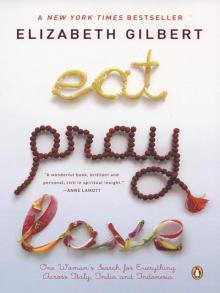 Eat, Pray, Love
Eat, Pray, Love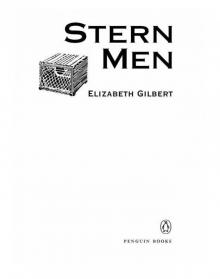 Stern Men
Stern Men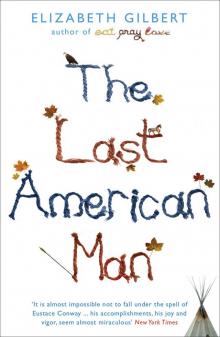 The Last American Man
The Last American Man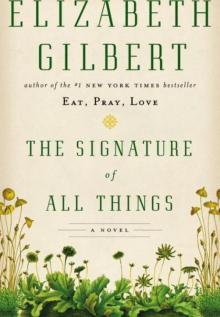 The Signature of All Things
The Signature of All Things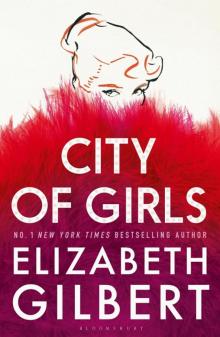 City of Girls
City of Girls Pilgrims
Pilgrims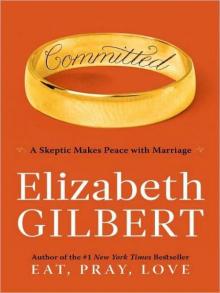 Committed: A Skeptic Makes Peace With Marriage
Committed: A Skeptic Makes Peace With Marriage Big Magic
Big Magic Committed
Committed The Best American Travel Writing 2013
The Best American Travel Writing 2013